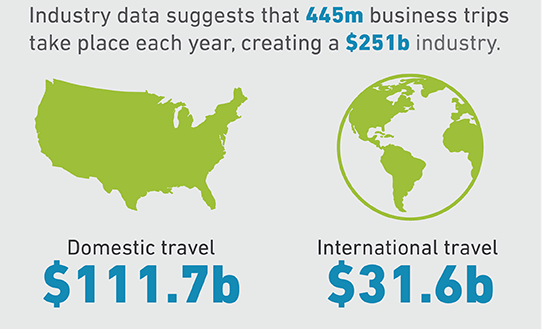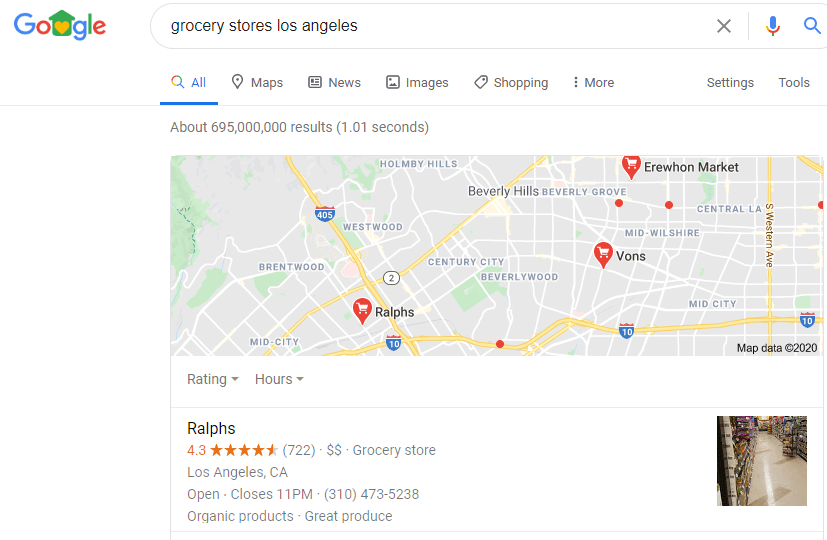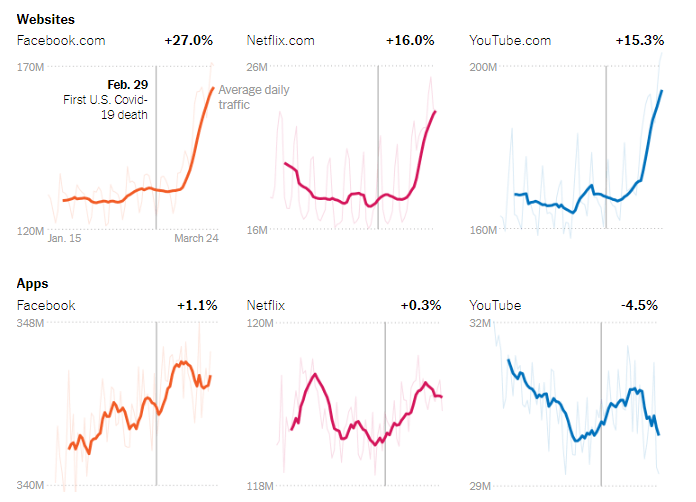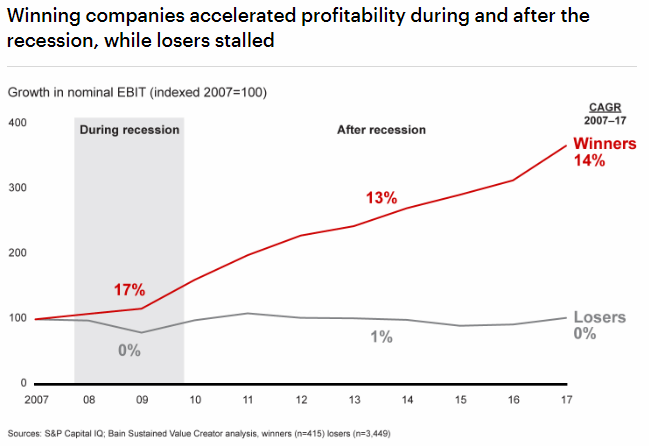Now that business travel has come to a halt, what should you do with your travel budget?
As we see it, there are three options:
- Save that money for when business trips are possible again.
- Allocate that money to another part of your business operation.
- Use that money as a toilet paper replacement.
As appealing as the first and last choices are, we recommend going with the second. And, more specifically, investing any unusable business travel spend into digital marketing.
That might seem counterintuitive.
However, consumers still need goods and services, and they are relying on the internet to find people to do business with. So, you want to make sure you’re there for them when they need you.
Throughout the Coronavirus outbreak (and resulting recession), we have been examining the best ways to weather, overcome, and even grow during the economic downturn and rapid changes in consumer habits. What we’ve found is that the best way to protect volatility is not to stifle spending.
Instead, refocusing spending during a recession is a safer bet.
This has been the running theme throughout our ongoing look at handling the Coronavirus recession, including:
- 3 Ways to Keep Revenue Growing During a Lockdown
- 5 Ways to Capture Market Share in a Recession
- Why You Shouldn’t Cancel Your Digital Marketing Services During a Recession
As travel expenses fall by the wayside, we are similarly finding that rather than saving that money for when travel resumes or in preparation for other future uncertainties, it is better to use those funds to protect against present realities.
In other words, investing your travel spend dollars online is a smart move right now.
Comparing ROI: Travel Spend vs. SEO and Paid Media
According to Motus, the average business trip costs $1,293. Depending on your business, that might seem either high or low. But what is even more telling across the board is what we get in return for that spend.

To that end, Certify reports that from the 445 million business trips that occur each year, every dollar spent on travel provides:
- $9.50 increase in revenue
- $2.90 increase in profit
That calculates as a 190% ROI from business travel.
Numbers like those make nixing business trips due to Coronavirus, a hard pill to swallow.
But it doesn’t have to be.
We just need to find an equally lucrative revenue-generating channel to invest those temporarily defunct travel funds into. Ideally, one that is recession-proof, or close to it.
In a recession (or even non-recession for that matter), the primary goal of any business marketing strategy is to connect with a target audience. Which means you want to be where the customer is. As social distancing and quarantining are sending people indoors and online in record numbers, digital marketing is the best equipped to make that happen.
That’s why SEO and paid media are as close to a recession-proof strategy during the current economic downturn.
But are they enough to compensate for losses in business trip revenue?
Short answer: YES!
Slighter longer answer: Paid media campaigns provide an estimated 200% ROI. The ROI of SEO (although harder to accurately calculate) is equally, if not more impressive. According to one study, a well-strategized SEO campaign results in a 200-275% ROI.

In both instances, these two digital marketing channels exceed the typical ROI of business travel.
While we’re not saying that companies should scrap travel for digital marketing regularly, in times when business trips are an impossibility, allocating that budget into growing your online presence can be a great substitute.
Why Invest Travel Spend into Paid Media

The reaction to COVID-19 as impacted paid media advertising in the following ways:
- More people on Google and visiting ad-rich sites.
- Cost-per-click has decreased on average across many paid media verticals.
- Competition has decreased, as many businesses pull back spending.
The factors above create an excellent opportunity to pick up market share.
As the crisis continues, both costs and competition are likely to continue decreasing. This means there has been no better time to use paid media advertising. Additionally, with online traffic volume skyrocketing, especially on news sites, display networks have become more valuable to digital marketers than ever.
To get the most out of your paid media ads, we recommend diversifying between two different targeting strategies:
- Target Strategy #1: High intent, longtail queries
This strategy involves monitoring trends closely (using Google Trends) to see how people are searching online at any given moment and see how people’s priorities and interests are changing. Google has also released Google trend Coronavirus Hub to further help track COVID-19 related search trends.

Once you find your keyword-rich search queries, identify which match your target audience with the highest likelihood to buy, and create messaging and content around those queries. Depending on your industry, this may require excluding COVID-19 related searches, such as:
- Coronavirus
- Corona
- Covid
- Virus
- Pandemic
- Epidemic
The key is being super specific with your keywords (hence the “longtail”) is to mine cheaper traffic with higher relevance.
- Target Strategy #2: Low intent, top-level funnel conversions
This strategy is a longer-term play focusing on macro conversions. The goal is to less make a sale in the now, which is becoming increasingly tricky as households reduce spending, and more to generate brand awareness, trust, and build remarketing lists. So instead of trying to overcome buyer hesitation forcefully, your brand tactfully positions itself top-of-mind when confidence returns, and people are more inclined to buy.
How each brand generates this goodwill and converts into marketing-qualified leads (MQLs) will vary. But it typically involves creating ads around industry-relevant, thought leadership content that provides value to your audience when facing the pain points associated with the Coronavirus.
Keep in mind, Google originally banned Coronavirus-related ads. But now they are starting to lift that ban so certain industries can start providing COVID-19 relevant messaging to their audience via paid media.
Why to Invest Travel Spend into SEO

One of the worst mistakes a brand can do right now is halt its SEO campaigns. Not only will you drop traffic, lose leads, miss conversions, and decrease revenue, but you’ll fall behind your competitors. Instead, while everyone else is either pulling back or keeping their SEO spends stagnate, you should boost yours with your “extra” travel budget.
Safeguarding against your competitors moving higher than you on search engine result pages (SERPs) will ensure that when the recovery occurs, you’re not playing catch up. It takes a fraction of the cost to maintain and improve rankings compared to the loss of revenue that arises from a SERP freefall.
So the smart move is to prevent that drop from ever happening.
This means strategizing your SEO campaigns around three types of searches:
- SEO Target Strategy #1: Current Search Habits
Very likely, your audience is most concerned right now with how Coronavirus will impact their lives and businesses. So a lot of their searches are focused around that topic. This means you should be creating and optimizing organic content around people’s current priorities and interests, as it relates to your business.
Just like with the first targeting strategy for paid media, we recommend monitoring Google Trends closely and generating time-relevant content that provides the answers to the queries your audience is currently seeking.
For example, there are a lot of people who planned a move during this time, and are concerned about how to do it safely. So in response, businesses like Moving.com and Pods have created SEO-centric content answering those concerns.

- SEO Target Strategy #2: Normal Search Habits
Eventually, the Coronavirus will be contained, and the economy will recover. When it does, consumer spending habits will stabilize. So you want to start preparing today for that surge.
Since SEO is a long-term strategy, unless you are targeting very time-sensitive queries, what you do today will affect your organic search several months from now. So continue your future SEO campaigns targeting the typical search habits of your audience. By increasing these efforts, using your unused travel spend, you can even gain an added boost by pressing on, while others are letting up.

- SEO Target Strategy #3: Local Searches
Local SEO might not apply to every business, but as our travel reduces and home quarantining increases, there is more of a need than ever for locally based services. So if your business relies on local search in any way, you will want to focus a large part of your immediate efforts on local SEO. This includes:
- Optimizing for “near me” searches
- Optimizing business info, address, and contact info on your site
- Optimizing Google My Business
- Optimizing local business directories like Angie’s List and Yelp
Also, be sure to stay up to date on changes made by Google as policies regarding reviews and new updates are constantly changing.

Conclusion: Put Your Corporate Travel Budget to Good Use with paid media marketing and SEO
Right now, every brand should be focused on two things:
- Staying ahead of the competition
- Preparing for the recovery bounce-back surge
Focusing on those strategies will position your business to do well during and after the Coronavirus recession. Which is why paid media and SEO are so important. They put your business on the offensive and defensive at the same time.
There is little to gain from unused travel spend. So instead, get the most bang for your buck by diversifying into these two bull markets
- Paid media: A short-term opportunity that can produce immediate gains
- SEO: A long-term safer bet that provides increasing dividends over time
By investing your otherwise unserviceable travel budget into these current low-cost, high-yield business strategies on Google, you can stay ahead of the competition, keep revenue flowing, and capture market share during the economic downturn.
That way, when things return to normal, and you can once again put that travel spend to good use, your business will be in the best position possible to take flight.









